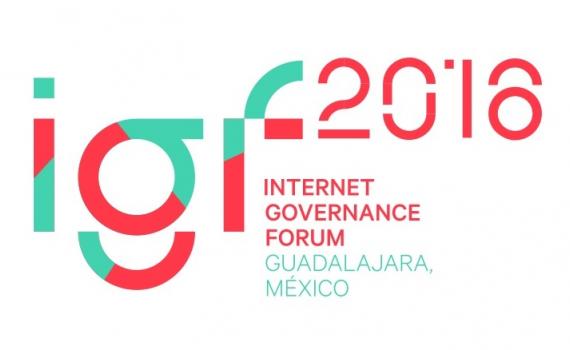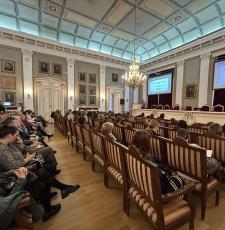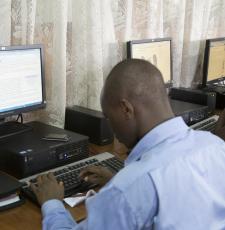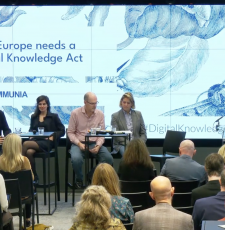
After attending the Internet Governance Forum 2016 in Mexico (6 - 9 December 2016), EIFL Public Library Innovation Programme (EIFL-PLIP) Advisor for Initiatives for Africa, Janet Sawaya, reflects on shifts in the global debate about internet inclusion, and observes a groundswell of interest in public libraries as essential internet access points.
It was heartening to see so many people at the Dynamic Coalition on Public Access in Libraries (DC-PAL) session at IGF 2016 – all speaking up for public libraries, and sharing valuable testimonies about how public libraries are increasing access to the internet.
EIFL is a founder member of the DC-PAL, which was formed seven years ago (in 2011) by EIFL and the International Federation of Library Associations and Institutions (IFLA) to engage the IGF community in discussion about the role and potential of public libraries in supporting the goal of universal access to the internet.
At this year’s DC-PAL session - according to IFLA Director, Policy & Advocacy, Stuart Hamilton, “the best yet” - there was vibrant discussion about ‘connecting the next billion’ – that is, helping more than one billion offline people across the globe to connect to the internet by 2020.
What was especially interesting was the diverse range of people present. In addition to librarians, many stakeholders from other sectors with an interest in internet connectivity, for example, the technology sector, attended the DC-PAL session.
Why the shift in focus?
Why has interest in the world’s 230,000 public libraries as essential access points for helping to connect the next billion been steadily growing?
After the DC-PAL session, Stuart and I reflected on a series of global meetings on internet access that have taken place over the past couple of years, and which the DC-PAL, including EIFL, has attended. Among these was a high-level meeting in Washington D.C., USA, organized by the US Department of State and the World Bank Group to advance the goals of the Global Connect Initiative, a multi-stakeholder programme that aims to bring 1.5 billion people who lack internet access online by 2020.
Several international organizations have commissioned and published research into global internet access, including the World Economic Forum, the International Telecommunications Union, and others. These reports have contributed to shifts in the debate about universal connectivity, finding that infrastructure is no longer the main reason why people are not connected.
Research titled ‘Offline and Falling Behind: Barriers to Internet Adoption’, conducted by McKinsey & Company, and tabled at the13-14 April 2016 GlobalConnect Initiative meeting in Washington D.C., found that the major stumbling blocks to people going online are poor internet skills, lack of relevant local content and lack of demand. Behind lack of demand is limited understanding of the value of the internet as an information channel, even where people have access to computers and good connections, the report concluded.
Access and technology skills are key areas where public libraries can make a difference. And the role of public librarians, who are trained information professionals, as information guides for people taking their first steps online and seeking relevant content cannot be underestimated.
Public libraries rising to the challenge
Public libraries in poor and developing countries have been rising to the challenge of connecting the next billion. The work of the EIFL Public Library Innovation Programme (EIFL-PLIP) shows how, with minimal additional resources, public libraries can offer services that popularize the internet by demonstrating its value in services targeting specific information and educational needs, for example, the needs of farmers, job-seekers, health workers, schoolchildren, older people and more.
Since 2009, EIFL-PLIP has supported development of successful innovative internet-based public library services, which are now being offered by over 300 public libraries in developing and transition economy countries in Africa, Asia, Latin America and Europe. EIFL-PLIP also shared case studies of these services to promote replication, and other libraries have taken up the exciting ideas generated by the EIFL-PLIP grantees.
More recently, EIFL initiated a major capacity building initiative for public librarians in Africa. The aim is to build capacity of public librarians to develop services focused specific local needs, to integrate ICT into their services, and to teach people in their communities to use ICT. Training in Ghana, Kenya and Uganda has been completed, and the initiative is now being expanded to include public library systems in other countries in Africa.
Librarians enrich discussion at IGF 2016
There were also more librarians than ever at the IGF 2016, as presenters, panelists and in the audience.
In addition to giving presentations and testimonies at the DC-PAL about how public libraries are increasing internet access and use, enthusiastic librarians fanned out into sessions of the broader IGF, making important contributions from the floor, and enriching discussion.
Opportunity to build partnerships and cement relationships
There were several concrete next steps that were agreed upon:
The IGF presented an opportunity for organizations to cement relationships and take forward work in increasing public internet access. Currently, a working group (including EIFL, IFLA, the Institute of Electrical and Electronics Engineers (IEEE), Internet Society (ISOC), Gigabit Libraries Network, People Centred Internet, Microsoft and the US and Tunisian governments) is discussing a pilot project that will expand internet connectivity in Tunisia.
In addition, there was general agreement that a closer partnership with the Dynamic Coalition on Community Connectivity (DC3), focused on community networks, could be very positive for DC-PAL, and that libraries would be excellent focal points for community connectivity projects.
Find out more
The IGF is a multi-stakeholder forum that brings together stakeholders from government, industry and civil society to discuss public policy issues relating to the internet.
SHARE / PRINT










